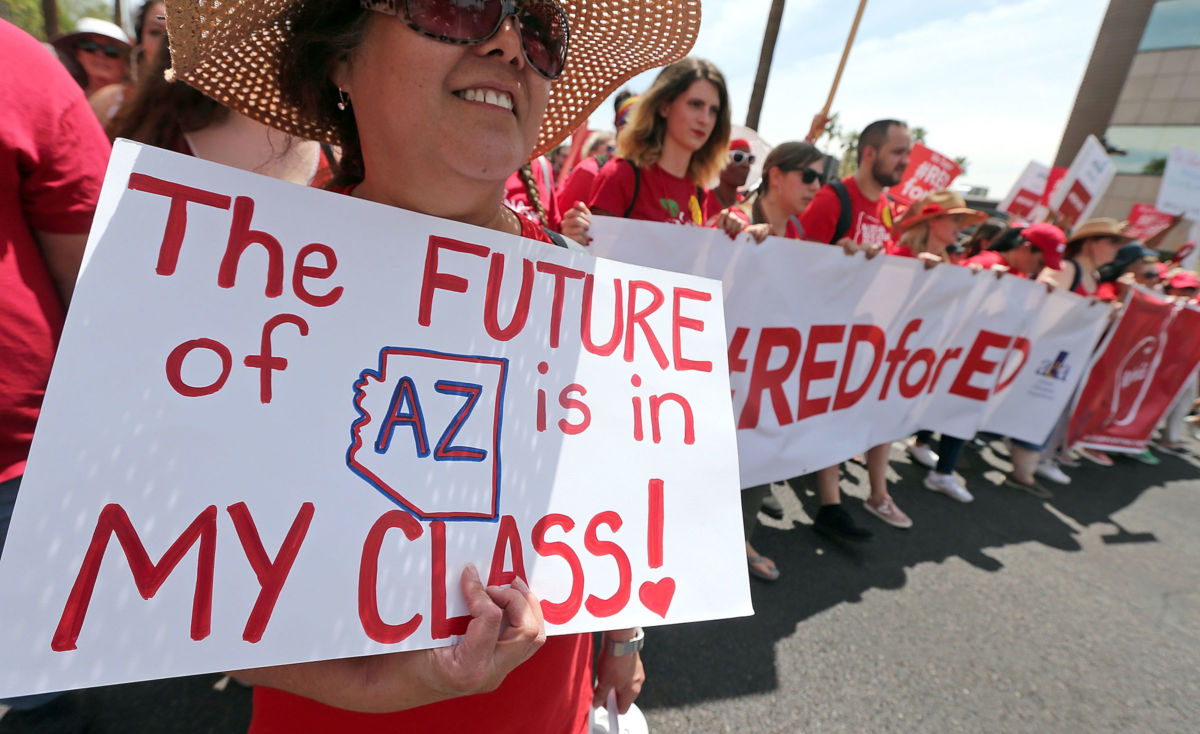An inspiring wave of teacher strikes swept the nation in 2018, including in states where teachers are not technically allowed to engage in labor actions. It looks like #RedForEd is continuing into 2019, with Los Angeles teachers back on the job after hammering out a deal and Denver teachers contemplating a strike of their own.
But in Arizona, the backlash has arrived — and it could be a warning sign for other organizing teachers in the US.
As public employees, teachers face certain restrictions in some states designed to make it harder to strike. And that has triggered much semantic debate about what constitutes a strike.
Is it still a strike if it’s a walkout? What about if the protest action targets lawmakers, not their employers and supervisors? In West Virginia, a misleadingly-termed “right to work” state, such actions are unlawful — but that didn’t stop a teacher uprising in early 2018.
Arizona lawmakers are clearly unhappy about the labor actions that occurred in their own state, and they’ve introduced legislation that’s hard to view as anything but punitive. One law would make it illegal to close a school except in very specific circumstances, like severe weather — and a labor action is not among those circumstances.
This proposal would also apply to charter schools, which have also become targets of strikes and walkouts as teachers get fed up about education inequality; charter school teachers in both Chicago and Los Angeles have hit the picket line recently.
Another bill is basically a gag order for teachers that forbids them from engaging in discussions about politics — like, say, campaigns for better play, improvements to school facilities and more staffing. That’s clearly and explicitly designed to make it okay to fire teachers for engaging in labor organizing.
But that’s not the end of this real stinker of a bill. The ethics code would ban teachers from talking with students about legislation, judicial action and other political events if they “endorsed” them. Imagine trying to teach a civics class where students ask your opinion about an issue and you can’t respond — or having students approach you to ask for help with a civic engagement project and having to say no.
Furthermore, teachers wouldn’t be allowed to call out racism or take on “controversial issues.” Basically, the legislature wants to tell Arizona teachers what and how to teach, in a move that may spark memories of the state’s attempt at banning ethnic studies. The law would also mandate more military recruiter access to students and their data, upholding a controversial practice.
Oklahoma has also introduced legislation that would ban strikes and punish teachers for participating in labor organizing. It’s clear that conservative lawmakers are furious and ready to start punching down at teachers, often in states where their pay is well below median for their profession.
Teachers across the US are struggling to make ends meet and serve their students, and state legislative moves like this suggest that lawmakers don’t value education or the professionals who make schools function. Taking away the legal right to organize makes it extremely challenging for teachers to be heard when they advocate on pay, working conditions, safety and other issues.
Some feel these laws are justified, arguing that public employees should not have a right to organize against the state, or that strikes are so disruptive that they should be suppressed. It’s certainly challenging for parents when school is closed, and they need to scramble to make alternate arrangements — but the long-term costs of tolerating untenable working conditions are simply too high.
If lawmakers don’t want teachers to strike, maybe they should pay them what they’re worth.
Join us in defending the truth before it’s too late
The future of independent journalism is uncertain, and the consequences of losing it are too grave to ignore. We have hours left to raise the $12,0000 still needed to ensure Truthout remains safe, strong, and free. Every dollar raised goes directly toward the costs of producing news you can trust.
Please give what you can — because by supporting us with a tax-deductible donation, you’re not just preserving a source of news, you’re helping to safeguard what’s left of our democracy.
